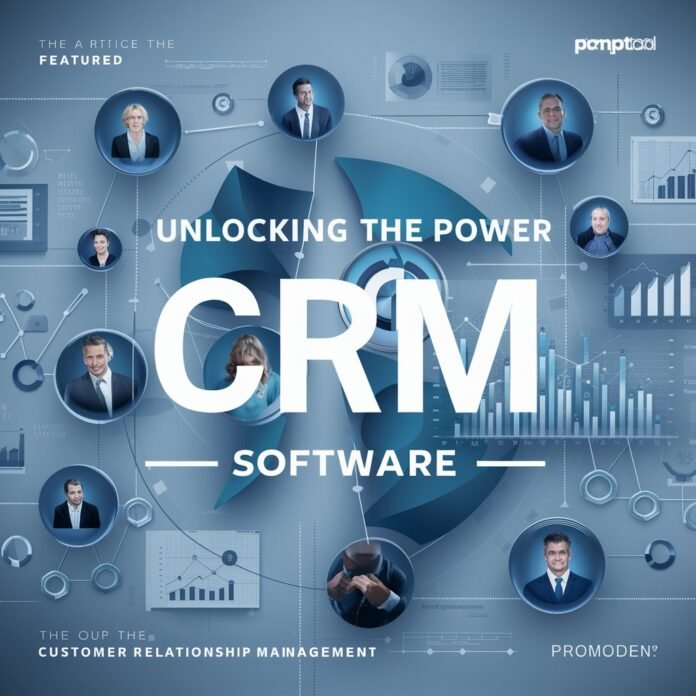Introduction
In today’s fast-paced business environment, building and maintaining strong relationships with customers is crucial for success. That’s where Customer Relationship Management (CRM) software comes into play. CRM software isn’t just a tool; it’s a strategy for businesses to manage interactions with current and potential customers effectively. By unlocking the power of CRM software, businesses can streamline operations, enhance customer satisfaction, and ultimately, drive growth. This article delves deep into what CRM software is, why it matters, and how businesses can leverage its full potential.
“Unlocking the Power of CRM. Ever wondered what CRM really means for businesses? CRM, or Customer Relationship Management, is more than just software—it’s a strategy for managing customer relationships effectively.”
Understanding CRM Software
What is CRM Software?
unlocking-the-power-of-crm-software, or Customer Relationship Management software, is a tool that helps businesses manage their interactions with customers, clients, and sales prospects. It provides a central database to store customer information, track interactions, and manage customer-related processes, such as sales, marketing, and customer service.
Key Features of CRM Software
- Centralized Database: A CRM system stores all customer information in one place, making it easy for teams to access and update data.
- Customer Interaction Tracking: CRM software tracks every interaction a customer has with your business, from emails and phone calls to social media interactions and in-person meetings.
- Automation: Many CRM systems offer automation features, such as sending follow-up emails, scheduling appointments, and generating reports, saving time and reducing the risk of human error.
- Analytics and Reporting: CRM software provides detailed reports and analytics, helping businesses understand customer behavior, sales trends, and the effectiveness of marketing campaigns.
Why CRM Software Matters
1. Improved Customer Relationships
At its core, unlocking-the-power-of-crm-software helps businesses build and maintain strong relationships with their customers. By having access to detailed customer information and interaction history, businesses can provide personalized and timely responses, leading to higher customer satisfaction and loyalty.
2. Increased Efficiency
CRM software automates many routine tasks, such as data entry, follow-up emails, and reporting. This not only saves time but also reduces the risk of errors, allowing your team to focus on more strategic activities.
3. Better Sales Management
CRM software provides valuable insights into your sales pipeline, helping you identify trends, forecast sales, and manage leads more effectively. With a clear view of the sales process, businesses can make informed decisions that lead to higher conversion rates.
4. Enhanced Collaboration
With a centralized database, unlocking-the-power-of-crm-software enables teams across departments—such as sales, marketing, and customer service—to collaborate more effectively. Everyone has access to the same information, ensuring that all teams are aligned and working towards common goals.

Choosing the Right CRM Software
1. Identify Your Business Needs
Before selecting a CRM system, it’s essential to understand your business’s specific needs. Consider factors such as the size of your business, the complexity of your sales process, and the level of customer support you require. This will help you narrow down your options and choose a CRM system that best fits your business.
2. Evaluate CRM Features
Not all CRM systems are created equal. Some offer basic contact management features, while others provide advanced automation, analytics, and integration capabilities. Evaluate the features of each CRM system and determine which ones are most important for your business.
3. Consider Integration Capabilities
Your CRM system should integrate seamlessly with your existing software, such as your email marketing platform, accounting software, and customer service tools. This ensures that all your systems work together, providing a comprehensive view of your business operations.
4. Test Usability and Support
A CRM system is only effective if your team uses it. Ensure that the CRM software you choose is user-friendly and provides adequate support, whether through online resources, customer service, or training sessions.
Implementing CRM Software
1. Plan Your Implementation
Implementing a CRM system is a significant undertaking that requires careful planning. Start by defining your goals and creating a timeline for the implementation process. Involve key stakeholders from different departments to ensure that the system meets everyone’s needs.
2. Data Migration
Migrating data from your existing systems to the new CRM software is a critical step. Ensure that all data is accurate and up-to-date before migration. Consider hiring a data migration specialist if necessary to avoid data loss or corruption.
3. Training and Adoption
Once the CRM system is in place, it’s essential to train your team on how to use it effectively. Provide comprehensive training sessions and resources to ensure that everyone is comfortable with the new system. Encourage adoption by highlighting the benefits of the CRM system and how it will make their jobs easier.
4. Monitor and Optimize
After implementation, monitor the performance of the CRM system and gather feedback from users. Use this feedback to make any necessary adjustments and optimize the system for better performance. Regularly review your CRM processes to ensure that they align with your business goals.
Unlocking the Full Potential of CRM Software
1. Personalize Customer Interactions
One of the most powerful features of CRM software is its ability to provide personalized customer experiences. Use the data stored in your CRM system to tailor your interactions with customers based on their preferences, purchase history, and behavior. Personalization can significantly improve customer satisfaction and increase the likelihood of repeat business.
2. Automate Marketing Campaigns
CRM software allows businesses to automate their marketing efforts, from email campaigns to social media posts. By automating these processes, businesses can reach a larger audience and nurture leads more effectively. Use CRM analytics to track the success of your campaigns and make data-driven decisions to optimize future efforts.
3. Improve Customer Support
A CRM system provides a comprehensive view of each customer’s history with your business, making it easier for customer service teams to resolve issues quickly and efficiently. Use the CRM software to track customer inquiries, monitor response times, and ensure that your team provides consistent and high-quality support.
4. Analyze and Forecast Sales Trends
CRM software offers powerful analytics tools that can help businesses identify sales trends, forecast future sales, and make informed decisions. Use these insights to optimize your sales strategy, allocate resources more effectively, and drive revenue growth.
Conclusion
Unlocking the power of CRM software is essential for businesses looking to improve customer relationships, increase efficiency, and drive growth. By choosing the right CRM system, implementing it effectively, and leveraging its full potential, businesses can gain a competitive edge in today’s market. Whether you’re a small business or a large enterprise, CRM software can help you achieve your business goals and take your customer relationship management to the next level.
FAQs About CRM Software
Q1: What is CRM software, and why is it important for businesses?
CRM software is a tool that helps businesses manage their interactions with customers, clients, and sales prospects. It is essential for businesses because it improves customer relationships, increases efficiency, and provides valuable insights into sales and marketing efforts.
Q2: How do I choose the right CRM software for my business?
To choose the right CRM software, identify your business needs, evaluate CRM features, consider integration capabilities, and test usability and support.
Q3: What are the key features of CRM software?
The key features of CRM software include a centralized database, customer interaction tracking, automation, and analytics and reporting tools.
Q4: How can CRM software help improve customer support?
CRM software provides a comprehensive view of each customer’s history with your business, making it easier for customer service teams to resolve issues quickly and efficiently.
Q5: How do I ensure successful implementation of CRM software?
To ensure successful implementation, plan your implementation process, migrate data carefully, provide comprehensive training to your team, and regularly monitor and optimize the system.




